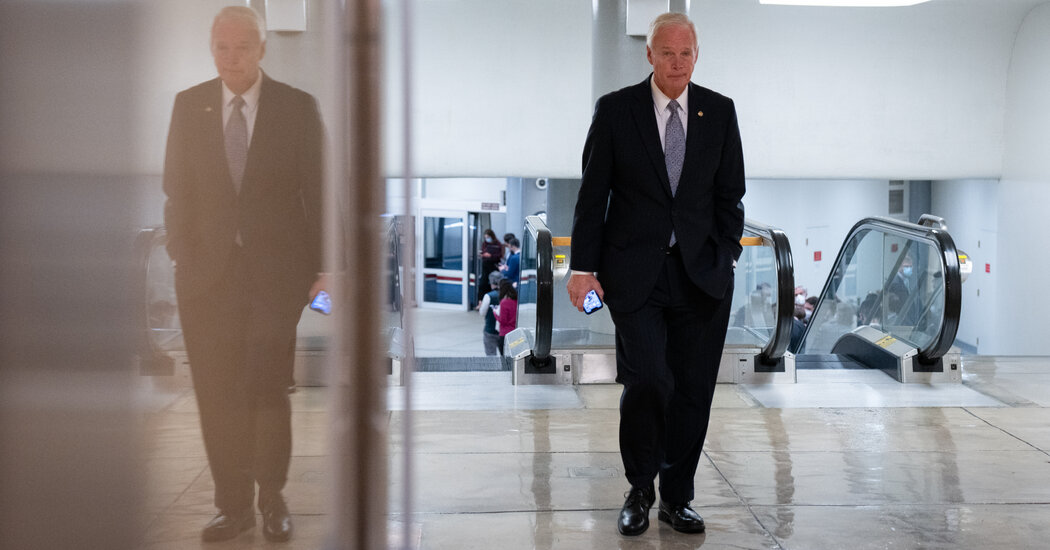The renewed bid for office by Mr. Johnson, who has spread many false claims about the 2020 election and Covid, ensures that both parties will be highly invested in Wisconsin’s 2022 Senate race.
WASHINGTON — Senator Ron Johnson, a Republican from Wisconsin who over the last year has become the Senate’s leading purveyor of misinformation about elections and the coronavirus pandemic, announced Sunday that he would seek re-election to a third term.
Mr. Johnson, 66, had pledged to step aside after two terms but opened the door to a third shortly before the 2020 presidential election.
His entry into the race is certain to focus enormous attention on Wisconsin, a narrowly divided political battleground where Gov. Tony Evers, a Democrat, faces his own difficult re-election bid in a race that may determine control of the state’s election systems ahead of the 2024 presidential contest.
“Today, I am announcing I will continue to fight for freedom in the public realm by running for re-election,” Mr. Johnson wrote in an essay published Sunday in The Wall Street Journal.
Mr. Johnson’s decision follows an announcement Saturday from another Senate Republican weighing retirement, Senator John Thune of South Dakota, that he would seek a fourth term.
The Wisconsin Senate contest is expected to be among the tightest in the country. Mr. Johnson is loathed by Democrats and has attracted a double-digit field of challengers vying to take him on in the general election. Local Democrats have been raising money for nearly a year to build a turnout machine for the 2022 midterm elections.
When Mr. Johnson first entered politics in 2010 as a self-funding chief executive of a plastics company founded by his wife’s family, he defined himself as a citizen legislator in contrast with Senator Russ Feingold, a Democrat who had been in public office for 28 years. Mr. Johnson was carried into office by that year’s Tea Party wave, then beat Mr. Feingold again in 2016 as Donald J. Trump became the first Republican presidential nominee to win Wisconsin in 32 years.
All along, Mr. Johnson pledged to serve no more than 12 years in the Senate, but he began to privately reconsider after the 2018 elections, when Democrats took back control of the House of Representatives and won narrow victories in Wisconsin’s statewide elections. He wrote Sunday that when he made reiterated his two-term pledge during his 2016 race he didn’t anticipate “the Democrats’ complete takeover of government and the disastrous policies they have already inflicted on America and the world.”
Suddenly the leader of Wisconsin Republicans and the lone G.O.P. official elected to statewide office, Mr. Johnson wavered on his pledge as he became the subject of an intense lobbying campaign from Republicans in both Wisconsin and Washington. They argued that if he did not run again, the party would jeopardize a seat that could tilt the balance of the Senate in 2023.
Mr. Johnson wrote that he was seeking a new term because “I believe America is in peril,” adding: “Much as I’d like to ease into a quiet retirement, I don’t feel I should.”
This year, Mr. Johnson has been at the forefront of the two strongest strains of misinformation coursing through the Republican Party — false claims about election administration and public health.
In the days after the 2020 election, he challenged Joseph R. Biden Jr.’s victory. During a Senate hearing in February, he read into the record a report that falsely suggested the Trump-inspired Jan. 6 assault on the Capitol had been instigated by “fake Trump supporters.” In November, he began urging Wisconsin’s Republican state legislators to seize control of federal elections in the state, arguing that they could do so without the governor’s approval, despite decades-old rulings from the U.S. Supreme Court and the Wisconsin Supreme Court that say otherwise.
Aside from Mr. Trump, there is perhaps no major Republican official who has made more false claims about the coronavirus and its vaccines than Mr. Johnson. He has said he will not get vaccinated, and has promoted discredited Covid-19 treatments and declined to encourage others to seek out the vaccines. In December, he falsely claimed that gargling with mouthwash could help stop transmission of the virus, an assertion that drew a rebuke from the manufacturer of Listerine.
The Coronavirus Pandemic: Key Things to Know
The global surge. The coronavirus is spreading faster than ever, but it appears that Omicron is milder than previous variants. Still, the latest surge in cases is causing hospitalizations in the U.S. to rise and lifesaving treatments to be rationed.
While Mr. Johnson’s false claims have picked up pace recently, they go back years. During his 2010 campaign, he said that climate change was caused by “sun spots” and that excess carbon dioxide in the atmosphere “helps the trees grow.”
For Wisconsin Democrats, Mr. Johnson is both their strongest fund-raising boogeyman and a figure many of them view as an embarrassment to the state along the lines of Senator Joseph McCarthy.
“He’s an active menace to American democracy, a threat to public health and an economic saboteur of the middle class,” said Ben Wikler, chairman of the Democratic Party of Wisconsin. “His sole redeeming quality in public life is that in 2022, he’s going to inspire Democrats to organize and turn out.”
The Democrats vying to challenge Mr. Johnson include Lt. Gov. Mandela Barnes; the state treasurer, Sarah Godlewski; Tom Nelson, the executive of Outagamie County, which includes Appleton in Wisconsin’s Fox Valley; Alex Lasry, an executive with the Milwaukee Bucks basketball team, and a handful of lesser-funded candidates. None of the Democratic challengers are as well known in the state as Mr. Johnson.





























